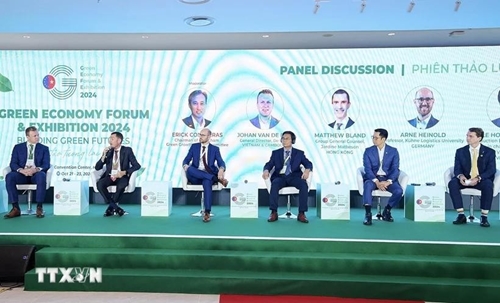It focused discussions on the potential for renewable energy development in Vietnam, as well as the mechanisms, policies, laws, regulations, and standards aimed at achieving sustainable energy transition in the coming time.
    |
 |
|
Experts talk about energy transition cooperation at the Green Economy Forum and Exhibition 2024 |
Tang The Hung, Deputy Director of the MoIT’s Electricity and Renewable Energy Authority, stated that energy transition is currently a trend over the globe, including in Vietnam.
To effectively implement the process, focus should be placed on two main tasks, namely transitioning the use of input energy by shifting from fossil fuels such as coal and oil to clean, emission-free energy sources like solar, wind, and nuclear energy; and perfecting policies and mechanisms, and implementing tasks and solutions to promote the reduction of greenhouse gas emissions, as well as closely monitoring sources of emissions.
In Vietnam, the Government's direction and efforts in implementing energy transition towards achieving net-zero emissions by 2050, as committed by the Prime Minister at the 26th United Nations Climate Conference (COP26), are clearly reflected in recently-issued policies, particularly in the national energy master plan and the eighth power development master plan, Hung added.
Stuart Livesey, Country Director of Copenhagen Offshore Partners (COP) in Vietnam, a unit developing numerous projects for the management, construction, and operation of offshore wind projects in the country, said that the demand for funding for renewable energy is increasingly significant.
Over the recent years, companies operating in Vietnam have made commitments to green economy and green energy, he said, adding that as Vietnam has set a goal of achieving net zero emissions by 2050, offshore wind energy is one of the important solutions.
Ananth Chikkatur, Chief-of-Party for the USAID Vietnam Low Emissions Energy Programme II (V-LEEP II), shared that the eighth power development master plan creates many opportunities to promote renewable energy, which can lead to significant transformations in renewable energy over the next few years, and ensure stability and certainty in energy for the long term.
Chikkatur showed his belief that beyond energy policies, there is a need for mechanisms to facilitate carbon credit trading.
Source: VNA